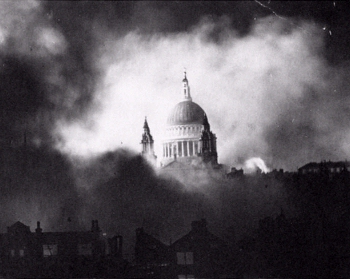September 8, 1940, was the first full day of a new strategy by the Luftwaffe as part of Nazi Germany’s plan to invade Great Britain. Starting at tea time on September 7 and lasting until May 10, 1941, German bombers specifically targeted major British civilian and industrial centers. London was attacked for 76 consecutive nights and over 43,000 civilians were killed across the country.
 The Blitz originally began as part of the Battle of Britain which lasted from July until October 1940. In July, the Luftwaffe targeted shipping centers and fleets but by August they had shifted their focus to RAF airfields and later the industrial centers producing planes and parts for the RAF. The Battle of Britain was the first all-aircraft battle in history and is generally seen as one of the decisive battles in WW2 as the German failure to obtain air superiority effectively prevented any possibility of invasion of the Home Islands. And it was a stunning victory for the British. Outnumbered, the British employed various tactical advantages to make up for their deficiencies — the small area which they had to defend, the establishment of overlapping radar detection stations all along the coastline, and the recruitment of experienced pilots from other nations.
The Blitz originally began as part of the Battle of Britain which lasted from July until October 1940. In July, the Luftwaffe targeted shipping centers and fleets but by August they had shifted their focus to RAF airfields and later the industrial centers producing planes and parts for the RAF. The Battle of Britain was the first all-aircraft battle in history and is generally seen as one of the decisive battles in WW2 as the German failure to obtain air superiority effectively prevented any possibility of invasion of the Home Islands. And it was a stunning victory for the British. Outnumbered, the British employed various tactical advantages to make up for their deficiencies — the small area which they had to defend, the establishment of overlapping radar detection stations all along the coastline, and the recruitment of experienced pilots from other nations.
You might recall that last week, I mentioned that a significant number of Polish soldiers and pilots escaped to Britain. Over 35,000 in total, around 8,500 of whom were airmen. However, only 145 of them served as fighter pilots in the RAF (along with over 400 other non-British pilots — New Zealand and Canada also had over 100 pilots in the RAF each) during the Battle of Britain. The Polish pilots were notable for their experience, most having already fought in the September Campaign, and several in the Battle of France. The first two fully Polish squadrons, the 301 and 303, went into action in August 1940. The 303 was known as the Kościuszko Squadron, after a Polish patriot (who also served with distinction with the American colonial forces during the American Revolution), and despite entering the battle on August 30, claimed 126 kills, the highest of any single squadron during the war. And their losses were 70 percent less than other RAF squadrons.
Because of the RAF’s outstanding efforts and the continuing increase in British industrial production, the Luftwaffe was never able to obtain air superiority, so in September, they shifted their attacks to general industrial targets and civilian centers to attempt to reduce the British morale. But because of the lack of air superiority, bombing attempts were mostly limited to night time when fighter planes were less effective — in the days before on-board radar and other targeting systems, fighter pilots had to be able to see what they were shooting at. The early part of the Blitz focused almost entirely on London, with targets spreading to other industrial cities and ports from November 1940 to February 1941 and then shifting almost exclusively to ports from February until May to assist the German Navy during the Battle of the Atlantic.
By May, the increasingly heavy air and ground defenses began to take a significant toll on the Luftwaffe, and the Germans decided to cease the bombings as being ineffective and began shifting their bomber units to the Eastern Front to support the attack on the Soviet Union. The Blitz is perhaps the most significant part of the war in the British collective consciousness. It has been depicted in numerous movies and books even in stories produced recently. As much as we owe to the soldiers and sailors and pilots who fought in WW2 (“Never in the field of human conflict was so much owed by so many to so few.” — Winston Churchill), we also owe a great deal to the civilians who resisted the psychological warfare and organized and defended their homes, and today we should remember them and those who lost their homes and lives during the Blitz. And let them know that it was indeed Britain’s finest hour.
Upon this battle depends the survival of Christian civilization. Upon it depends our own British life and the long continuity of our institutions and our Empire. The whole fury and might of the enemy must very soon be turned on us now. Hitler knows that he will have to break us in this island or lose the war. If we can stand up to him, all Europe may be free and the life of the world may move forward into broad, sunlit uplands. But if we fail, then the whole world, including the United States, including all that we have known and cared for, will sink into the abyss of a new Dark Age, made more sinister, and perhaps more protracted, by the lights of perverted science. Let us therefore brace ourselves to our duties, and so bear ourselves that, if the British Empire and its Commonwealth last for a thousand years, men will still say, ‘This was their finest hour.’ — Winston Churchill, Speech to the House of Commons, June 18, 1940


